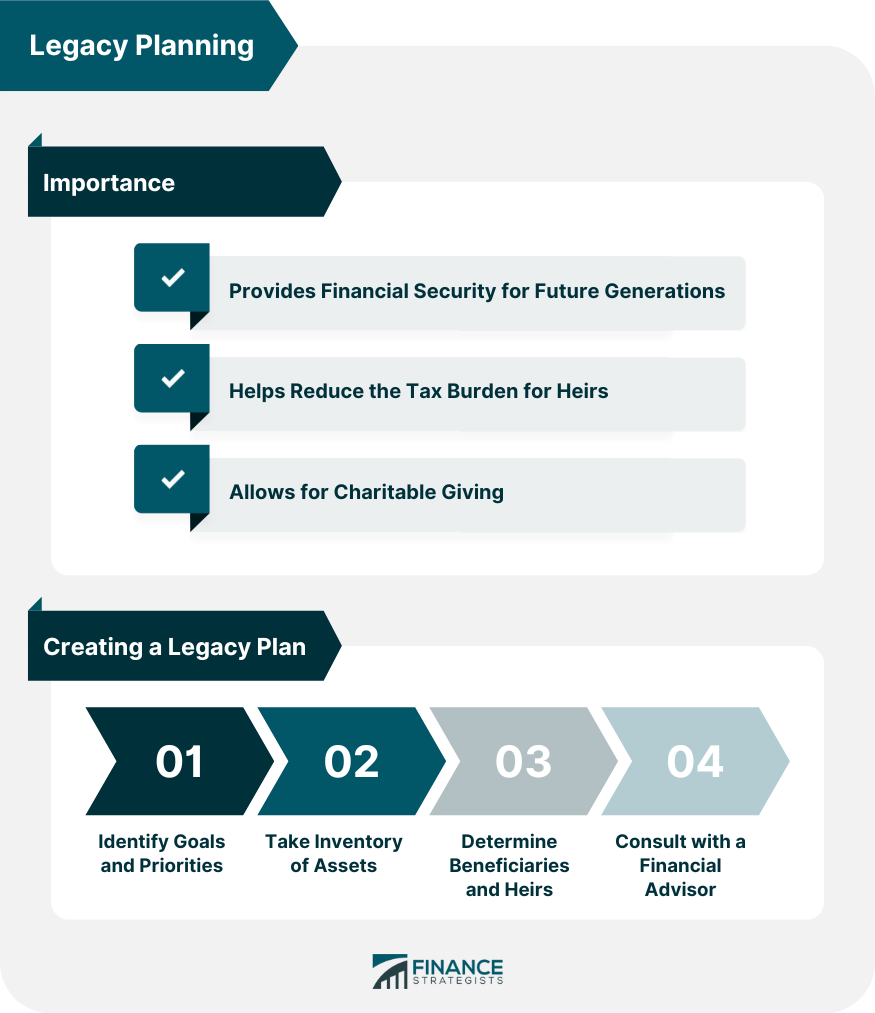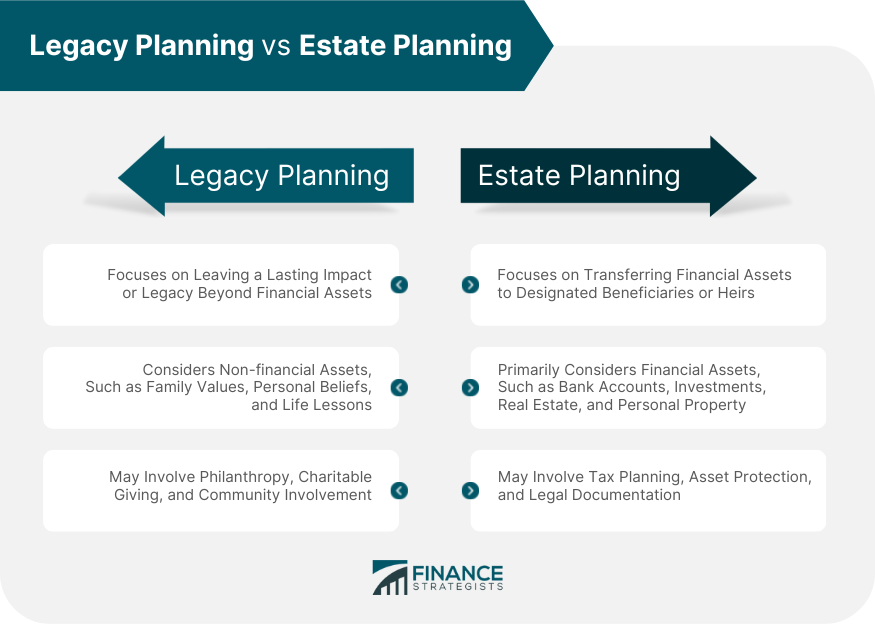Legacy planning is creating a comprehensive plan to transfer an individual's assets, values, or beliefs to his beneficiaries or heirs after death. It involves developing a strategy that ensures the process aligns with the individual's goals and values. Creating a legacy plan involves various tasks, including creating a will or trust, designating beneficiaries for life insurance policies and retirement accounts, and establishing a plan to distribute financial assets such as family heirlooms or personal possessions. A well-thought-out legacy plan can help to minimize conflicts and disputes between beneficiaries, reduce taxes and other expenses, and ensure that assets are distributed in a way that reflects the individual's wishes.
I'm Taylor Kovar, a Certified Financial Planner (CFP), specializing in helping business owners with strategic financial planning. Legacy planning goes beyond traditional estate planning by focusing on the impact your wealth will have on future generations. It involves creating a strategic plan to manage your assets, ensuring they support your family's values and goals after you're gone. By incorporating trusts, wills, and charitable giving, legacy planning secures your financial heritage, providing peace of mind and fostering a lasting legacy. Explore how legacy planning can tailor a path that aligns with your vision and secures a prosperous legacy for your loved ones. Contact me at (936) 899 - 5629 or [email protected] to discuss how we can achieve your financial objectives. WHY WE RECOMMEND: IDEAL CLIENTS: Business Owners, Executives & Medical Professionals FOCUS: Strategic Planning, Alternative Investments, Stock Options & Wealth Preservation Legacy planning is a vital aspect of financial planning for the following reasons: Legacy planning plays an important role in ensuring the financial security of future generations by strategically transferring wealth to minimize the risks and maximize the benefits. By having a clear plan for how wealth will be managed and distributed, families can avoid conflicts and uncertainty that can arise without clear direction. This can minimize the risk or minimize the risk of family disputes and ensure that the family's wealth is used to align goals. Through legacy planning, individuals can significantly reduce the tax burden on their heirs by implementing tax-saving strategies such as establishing trusts or gifting assets during their lifetime. Without proper planning, heirs may be faced with significant estate taxes and inheritance taxes, which can significantly reduce the value of the estate they receive. Legacy planning also allows individuals to leave a lasting impact on causes and organizations they care about through charitable giving. Through a proactive and strategic approach to legacy planning, passed-on wealth can benefit the heirs and the wider community. By positively impacting society, families can create a lasting legacy that extends beyond their financial assets, positively impacting future generations. Creating a legacy plan requires careful planning and execution. Below are some steps to consider when creating a legacy plan: This can include financial goals, such as ensuring the financial security of your loved ones, as well as non-financial goals, such as preserving a family business or supporting a charitable cause. By identifying your goals and priorities, you can create a plan that reflects your values and helps you achieve the legacy you envision. Start by gathering all relevant financial documents, such as bank statements, investment account statements, and retirement account statements. You should also list all physical assets, such as real estate, vehicles, jewelry, and valuable artwork. Once you have a complete list of your assets, you should determine the value of each item. This may require some research or the help of a professional appraiser. It is also important to consider any debts or liabilities that you may have when taking inventory of your assets. This includes any outstanding loans or mortgages and any legal judgments or liens against your property. Decide who you want to receive each asset or portion of your estate. You may want to consider your family members, close friends, or charitable organizations. Once you have determined your beneficiaries and heirs, it is important to document your choices in your will, trust, or other estate planning documents. This will help ensure that your wishes are fulfilled and your legacy is preserved for future generations. As your life circumstances change, such as a marriage, divorce, birth, or death of a loved one, it is important to review and update your beneficiaries and heirs. When creating a legacy plan, consulting with a financial advisor can be helpful. A financial advisor can help you create a distribution plan that ensures your assets are distributed according to your wishes. They can help you identify beneficiaries, determine how assets will be transferred, and minimize the tax implications of your plan. Legacy and estate planning are two distinct approaches to transferring wealth and assets to future generations. Legacy planning focuses on ensuring future generations' financial security, reducing the tax burden on heirs, and leaving a lasting impact through charitable giving. It involves family dynamics, personal values, and long-term goals. On the other hand, estate planning is a narrower concept that specifically involves planning to distribute an individual's assets after their death. It covers bank accounts, investments, real estate, and personal properties. Legacy planning has a broader focus on leaving a lasting impact and ensuring the financial security of future generations. On the other hand, estate planning primarily focuses on the distribution of assets after an individual's death. Legacy planning involves creating a comprehensive plan to transfer an individual’s assets, values, or beliefs to his beneficiaries or heirs after death. This plan ensures the process aligns with the individual’s goals and values. To create a successful legacy plan, one needs to identify the goals and priorities, take inventory of assets, determine beneficiaries and heirs, and consult a financial advisor. Legacy and estate planning are two distinct approaches to transferring wealth and assets to future generations. Legacy planning focuses on ensuring financial security for future generations, reducing the tax burden on heirs, and leaving a lasting impact. Whereas estate planning primarily involves transferring assets and minimizing estate taxes.What Is Legacy Planning?
Learn From Taylor

Fee-Only Financial Advisor
Certified Financial Planner™
3x Investopedia Top 100 Advisor
Author of The 5 Money Personalities & Keynote Speaker
Importance of Legacy Planning
Provides Financial Security for Future Generations
Helps Reduce the Tax Burden for Heirs
Allows for Charitable Giving
Creating a Legacy Plan
Identify Goals and Priorities
Take Inventory of Assets
Determine Beneficiaries and Heirs
Consult with a Financial Advisor

Legacy Planning vs Estate Planning

Final Thoughts
Legacy Planning FAQs
Legacy planning is creating a comprehensive plan to transfer an individuals assets to his beneficiaries or heirs. The process may include creating a will, setting up trusts, and designating powers of attorney.
The benefits of having a well-designed legacy plan are (1) it provides financial security for future generations, (2) it reduces the tax burden for heirs, and (3) it allows for charitable giving.
Communicating the legacy plan is important to ensure that it will be implemented effectively and that all parties will understand their roles and responsibilities.
As your life circumstances change, such as a marriage, divorce, birth, or death of a loved one, it is important to review and update your beneficiaries and heirs.
Legacy planning is focused on leaving a lasting impact beyond financial assets. In contrast, estate planning primarily transfers financial assets to designated beneficiaries or heirs.
True Tamplin is a published author, public speaker, CEO of UpDigital, and founder of Finance Strategists.
True is a Certified Educator in Personal Finance (CEPF®), author of The Handy Financial Ratios Guide, a member of the Society for Advancing Business Editing and Writing, contributes to his financial education site, Finance Strategists, and has spoken to various financial communities such as the CFA Institute, as well as university students like his Alma mater, Biola University, where he received a bachelor of science in business and data analytics.
To learn more about True, visit his personal website or view his author profiles on Amazon, Nasdaq and Forbes.















